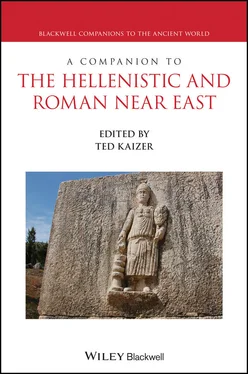In Book 2 of the Babyloniaca Berossos traces the Chaldaeans, as a group, back to the time of the great flood, and to King Xisouthros, who saved not only humankind but also the archive of human civilization:
τὸν Κρόνον αὐτῶι κατὰ τὸν ὕπνον ἐπιστάντα φάναι μηνὸς Δαισίου πέμπτηι καὶ δεκάτηι τοὺς ἀνθρώπους ὑπὸ κατακλυσμοῦ διαφθαρήσεσθαι. κελεῦσαι οὖν [διὰ] γραμμάτων πάντων ἀρχὰς καὶ μέσα καὶ τελευτὰς ὀρύξαντα θεῖναι ἐν πόλει Ἡλίου Σι[σ]πάροις (…) γενομένου δὲ τοῦ κατακλυσμοῦ καὶ εὐθὺς λήξαντος (…) τὸν (…) Ξίσουθρον (…) ἐκβῆναι μετὰ τῆς γυναικὸς καὶ τῆς θυγατρὸς καὶ τοῦ κυβερνήτου προσκυνήσαντα τὴν γῆν καὶ βωμὸν ἱδρυσάμενον καὶ θυσιάσαντα τοῖς θεοῖς, γενέσθαι μετὰ τῶν ἐκβάντων τοῦ πλοίου ἀφανῆ. τοὺς δὲ ὑπομείναντας ἐν τῶι πλοίωι μὴ εἰσπορευομένων τῶν περὶ τὸν Ξίσουθρον, ἐκβάντας ζητεῖν αὐτόν, ἐπὶ ὀνόματος βοῶντας· τὸν δὲ Ξίσουθρον αὐτὸν μὲν αὐτοῖς οὐκ ἔτι ὀφθῆναι, φωνὴν δὲ ἐκ τοῦ ἀέρος γενέσθαι, κελεύουσαν ὡς δέον αὐτοὺς εἶναι θεοσεβεῖς· καὶ γὰρ αὐτὸν διὰ τὴν εὐσέβειαν πορεύεσθαι μετὰ τῶν θεῶν οἰκήσοντα (…) εἶπέ τε αὐτοῖς, ὅτι ἐλεύσονται εἰς Βαβυλῶνα, καὶ ὡς εἵμαρται αὐτοῖς, ἐκ Σι[σ]πάρων ἀνελομένοις τὰ γράμματα διαδοῦναι τοῖς ἀνθρώποις (…) ἐλθόντας οὖν τούτους εἰς Βαβυλῶνα τά τε ἐκ Σι[σ]πάρων γράμματα ἀνορύξαι, καὶ πόλεις πολλὰς κτίζοντας καὶ ἱερὰ ἀνιδρυμένους πάλιν ἐπικτίσαι τὴν Βαβυλῶνα.
Kronos stood over him in his sleep and said that on the fifteenth of the month of Daisios mankind would be destroyed by a flood. He ordered him to deposit the beginnings and middles and ends of all writings under ground, in the city of the Sun, Sippar. (…) After the flood had come and straightaway ended, Xisouthros (…) disembarked with his wife and daughter, and the captain, and made obeisance to the earth, erected an altar and sacrificed to the gods. Then he disappeared together with those who had disembarked from the ship. When Xisouthros and the others did not come back in, those who had remained on the ship disembarked and searched for him, calling out his name. Xisouthros himself they no longer saw, but there was a voice from the air telling them that they should be god-fearing. For Xisouthros, it said, had gone to live with the gods because of his piety. (…) The voice also told them that they would go back to Babylon and that they were fated to fetch the writings from Sippar and hand them down to humankind. (…) So, when they went to Babylon, they dug up the writings from Sippar. After that, they founded many cities and temples, and settled Babylon anew.
What Berossos sketches here is an etiology of his own peers. The Chaldaeans, he suggests, started off as the “friends” ( philoi ) of Xisouthros, the mythical king from the time of the great flood. The conceptual framework is again Seleucid, though Berossos adds an important qualification: after the flood, the Chaldaeans can be friends of the king only at one remove; henceforth, their commitment is to kingship as an institution, and to the arts of civilization that underpin it. Berossos explains the shift from personal loyalty to institutional commitment as a process of loss and (partial) compensation: the Chaldaeans lose Xisouthros and are entrusted with the archive of civilization instead. This trade-off explains not only how they could preserve kingship for Nebuchadnezzar, but also what they might contribute to the flourishing of the Seleucid Empire as Berossos saw it – for the Seleucids too needed someone who maintained the kingship. Berossos’s own work seems conceived with just that aim in mind: by writing his history of kingship, he offered Antiochus the level of institutional support, experience, and wisdom that only the Chaldaeans could give.
Berossos was an extraordinary figure, and the Babyloniaca is an exceptionally interesting text. It is not sufficient to describe it as a typical product of the Hellenistic imagination, as has sometimes been suggested, nor should we content ourselves with saying that Berossos advertised Babylonian culture to his Greek masters. He did that too, as has transpired, but he also had a more interesting project: I have argued that he proposed a specifically Seleucid framework of concepts, institutions, and ideas to which Greek and Babylonian élites contributed, each in their own way. The (Greco-Macedonian) friends of the king expanded and defended the empire; and the (Babylonian-based) Chaldaeans guarded a tradition of kingship that went back to the very beginnings of the world. Berossos knew, and accepted, that Greco-Macedonian élites had all the power in the Seleucid Empire: as friends of the king, they were in control of the army and could even overthrow the incumbent monarch and install a new one. Yet, they could not uphold kingship as an institution or ensure the empire’s stability in the long term. For that, Berossos suggests, the Seleucids had to rely on the Chaldaeans, who guarded an archive of antediluvian wisdom, and with it the key to stable and universal kingship.
The most important editions of Berossos are Schnabel 1923 (with introduction), Jacoby 1958, and De Breucker 2010, 2012 (with introduction and commentary). Burstein 1978 and Verbrugghe and Wickersham 1996 offer useful translations with commentary. Haubold et al. 2013 is a collection of articles on many aspects of Berossos’s life and work. For social and cultural context see also Oelsner 1992; Van der Spek 2000; De Breucker 2003b; Boiy 2004; Clancier 2012b. Bach 2013 considers the issue of dating. For Berossos as a Seleucid author, see Kuhrt 1987; De Breucker 2003a; Dillery 2013, 2014; Haubold 2013a: 127–177 ; Kosmin 2013; Stevens 2019: 94–120; Visscher 2020: 110–118. There have been many studies of Berossos’s Babylonian sources. Dalley 2013b considers mythological texts: Enūma eliš (for which see also Frahm 2010; Haubold 2013b), Gilgamesh , and Atrahasis . For Berossos and Babylonian chronicle literature, see Drews 1975; Beaulieu 2007; Van der Spek 2008. For the astronomical fragments, see Steele 2013. Schironi 2013 and Madreiter 2013 discuss the early reception of the Babyloniaca . For the forgeries of Annius of Viterbo, see Grafton 1990; Stephens 2004, 2013. Ruffing 2013 traces the history of modern scholarship on Berossos. For a full bibliography, see Gufler and Madreiter 2013.
1 1On purely linguistic grounds, Bēl-rē’ûšu (“Bel is his shepherd”) seems the likelier candidate (Stevens 2019: 117–119), but Bēl-rē’ûšunu (“Bel is their shepherd”), which is actually attested, cannot be ruled out. For a suggestion that Berossos was a prominent Babylonian temple official called Bēl-rē’ûšunu, see Van der Spek 2000: 439.
2 2Eusebius puts him at the time of “Alexander, son of Philip,” by which he must mean Alexander the Great; for an alternative interpretation (“Alexander” = Alexander IV), see below, n.3.
Читать дальше












